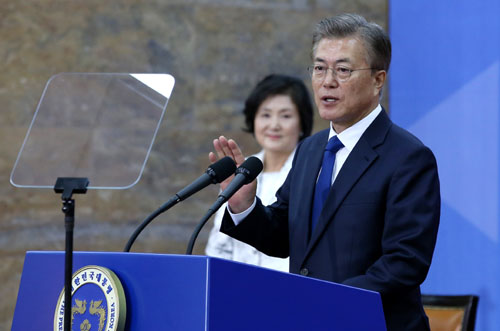by WorldTribune Staff, November 14, 2019
Despite pressure from the U.S. to back down, South Korean President Moon Jae-In is seen as intent on terminating a key intelligence-sharing pact with Japan, reports say.
Nov. 22 marks the deadline to terminate the General Security of Military Information Agreement (GSOMIA) between Seoul and Tokyo which was signed in 2016.

“It is unlikely that the presidential office will reverse its decision in light of Japan’s ongoing trade restrictions and its relentless stance on historical disagreements between the two countries,” sources told the Korea Times.
U.S. President Donald Trump has dispatched Defense Secretary Mark Esper to South Korea to press the Moon administration to renew the GSOMIA, which is the only bilateral, security-related agreement linking South Korea and Japan.
Related: Can Seoul and Tokyo cooperate? Yes, says U.S.; No, says Pyongyang, November 11, 2019
Led by the liberal Moon Jae-In, some leftists South Koreans “despise Japan more than their brother nation up North,” Asia Times columnist Andrew Salmon wrote, citing a poll for a state-run think-tank last week which found that, were war to break out between North Korea and Japan, 45.5 percent of South Koreans would help North Korea, and only 15.1 percent Japan.
“In sync with these sentiments, the left-leaning Moon Jae-In administration has focused on trying to upgrade ties with North Korea while firing relentless salvos against Japan.”
When meeting Esper and the U.S. delegation, Moon “is expected to explain the need to terminate the pact owing to Japan’s unchanged position on its trade restrictions against Korean companies,” the Korea Times reported on Nov. 14.
A Nov. 14 Chosun Ilbo report, citing an unspecified source in the U.S administration, said that the White House was preparing a statement containing a very critical view of the Moon administration if Seoul does not reverse its decision on the GSOMIA.
Salmon noted that, last year, South Korea “unilaterally undercut two bilateral deals” with Japan: a 2015 agreement on “comfort women” and a 1965 agreement on forced labor.
In response, in July this year, Tokyo introduced trade curbs on exports to South Korea – slowing, but not halting, the flow of key materials.
“That infuriated South Korea,” Salmon wrote. “Citizens reacted with consumer boycotts, while Seoul retaliated with its own trade curbs. Seoul then punted the dispute from the historical, diplomatic and economic spheres into the security space, announcing it was ending GSOMIA.”
The U.S. said renewing the pact is vital to the U.S.-Japan-South Korea “trilateral security cooperation.”
Salmon wrote: “South Korea is, geo-strategically, part of a critical perimeter for the United States – the frontline of a deeply echeloned Pacific defense that is layered back through Japan, Guam and Hawaii before reaching the continental U.S. itself. At the epicenter of Northeast Asia, South Korea is also well sited as a launch pad to monitor and interdict the assets of regional American competitors such as China, North Korea and Russia.”
Most recently, Salmon noted, South Korea “has built, mostly at its own cost, the massive U.S. bastion in Pyeongtaek, south of Seoul – America’s largest overseas base. Alliance management is no easy task. South Korea’s peculiarities, perhaps, make it a trickier ally than most. But its strategic value remains.”
During a Nov. 10 press conference, Chung Eui-Yong, chief of the South’s National Security Office, reiterated that Japan should make the first move and justified Korea’s decision to end the pact. “From our point of view, the recent difficulties in Korea-Japan relations were fundamentally caused by Japan,” Chung said. “I believe the Korean people understand that we could not extend the GSOMIA after Japan said that it carried out the trade restrictions because bilateral trust for security cooperation had been harmed.”
Chung also stressed that, contrary to rising criticism, there will be no impact from the GSOMIA termination on the Korea-U.S. alliance. “The impact on our national security from ending the GSOMIA will be limited. Also, this is a problem between Korea and Japan, and it does not have anything to do with the Korea-U.S. alliance.”
International relations analysts say otherwise. “It may serve as an opportunity for Japan and the U.S. to draw closer to each other in the absence of Korea, and will raise the question of whether Korea will/should take part in the U.S. and Japan’s vision for the Indo-Pacific,” Gi-wook Shin, a professor at Stanford University said.
Intelligence Brief __________ Replace The Media
